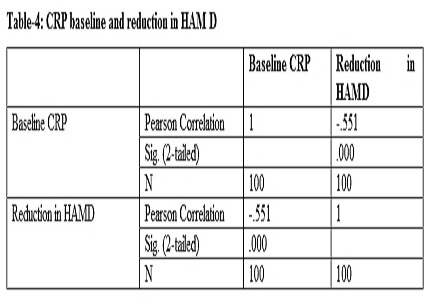Effects of Escitalopram on C reactive protein in patients of depression
Abstract
Objective: To study the anti-inflammatory activity of Escitalopram in newly diagnosed patients of depression.
Materials and Methods: 100 Newly diagnosed patients of Depression as per ICD 10 (International classification of diseases) DCR (Diagnostic criteria for research) were selected for study after applying strict inclusion and exclusion criteria. Baseline Hamilton depression rating scale (HAMD) and baseline C reactive protein (CRP) was assessed and antidepressant treatment was started. After 8 weeks, again HAMD and CRP were assessed.
Results: Mean of Baseline CRP was higher in patients in those who have no response after antidepressant treatment and it was significant. The relationship between baseline HAMD and baseline CRP was found to be significantly positively correlated. Mean HAMD was significantly reduced after 8 weeks of antidepressant treatment. Mean CRP was significantly reduced after 8 weeks of antidepressant treatment. The relationship between baseline CRP and reduction in HAM D (in baseline and after 8 weeks of treatment) found to be negatively correlated and it was significant.
Conclusion: Escitalopram reduced C reactive protein in depressed patient and result was significant.
Downloads
References
Schildkraut JJ. The catecholamine hypothesis of affective disorders: a review of supporting evidence. Am J Psychiatry. 1965 Nov;122(5):509-22.
Pigott HE, Leventhal AM, Alter GS, Boren JJ. Efficacy and effectiveness of antidepressants: current status of research. Psychother Psychosom. 2010;79(5):267-79. doi: https://doi.org/10.1159/000318293. Epub 2010 Jul 9.
Dowlati Y, Herrmann N, Swardfager W, Liu H, Sham L, Reim EK, Lanctôt KL. A meta-analysis of cytokines in major depression. Biol Psychiatry. 2010 Mar 1;67(5):446-57. doi: https://doi.org/10.1016/j.biopsych.2009.09.033. Epub 2009 Dec 16.
Howren MB, Lamkin DM, Suls J. Associations of depression with C-reactive protein, IL-1, and IL-6: a meta-analysis. Psychosom Med. 2009 Feb;71(2):171-86. doi: https://doi.org/10.1097/PSY.0b013e3181907c1b. Epub 2009 Feb 2.
Miller AH, Maletic V, Raison CL. Inflammation and its discontents: the role of cytokines in the pathophysiology of major depression. Biol Psychiatry. 2009 May 1;65(9):732-41. doi: https://doi.org/10.1016/j.biopsych.2008.11.029. Epub 2009 Jan 15.
HAMILTON M. A rating scale for depression. J Neurol Neurosurg Psychiatry. 1960 Feb;23:56-62.
R. Strawbridge et al. Inflammation and clinical response to treatment in depression: Ameta-analysis. European Neuropsychopharmacology 2015; 25:1532–1543.
YunshengMa et al. Association between Depression and Creactive Protein. Cardiology Research and Practice 2011:1-8.
Chavda N, Kantharia ND, Jaykaran. Effects of fluoxetine and escitalopram on C-reactive protein in patients of depression. J Pharmacol Pharmacother. 2011 Jan;2(1):11-6. doi: https://dx.doi.org/10.4103%2F0976-500X.77091.
Danijel Crnković, Danijel Buljan, Dalibor Karlović and Marija Krmek. Connection between inflammatory markers, antidepressants and depress ion Acta Clin Croat 2012; 51:25-33.
O'Brien SM, Scott LV, Dinan TG. Antidepressant therapy and C-reactive protein levels. Br J Psychiatry. 2006 May;188:449-52.
S. Lanquillon,J.-C. Krieg, U. Bening-Abu-Shach, and H. Vedder. Cytokine Production and Treatment Response in Major Depressive Disorder. Neuropsychopharmacology 2000;22:370-9.
Miller AH, Raison CL. The role of inflammation in depression: from evolutionary imperative to modern treatment target. Nat Rev Immunol. 2016 Jan;16(1):22-34. doi: https://doi.org/10.1038/nri.2015.5.
Kenis G, Maes M. Effects of antidepressants on the production of cytokines. Int J Neuropsychopharmacol. 2002 Dec;5(4):401-12.



 OAI - Open Archives Initiative
OAI - Open Archives Initiative


